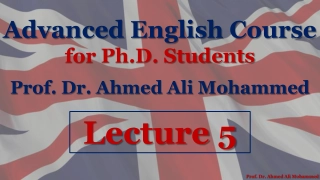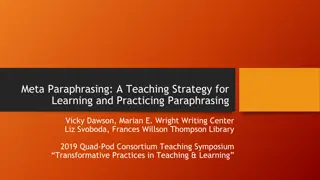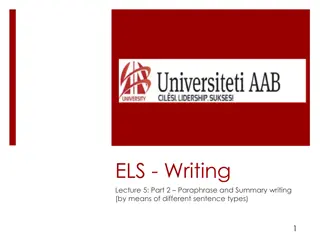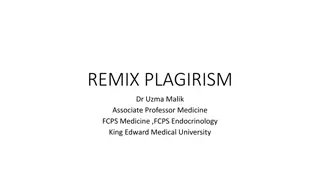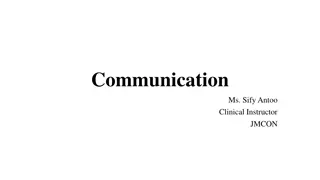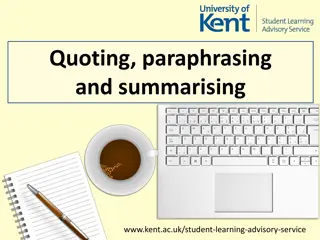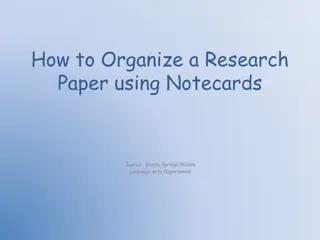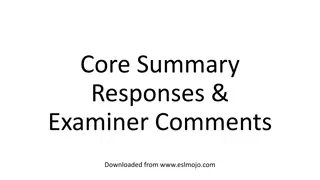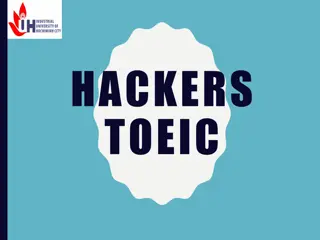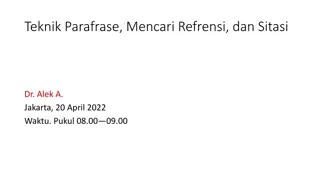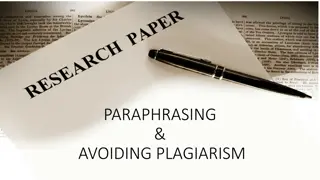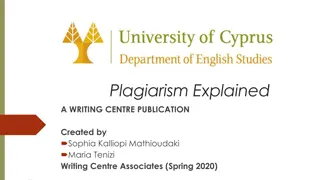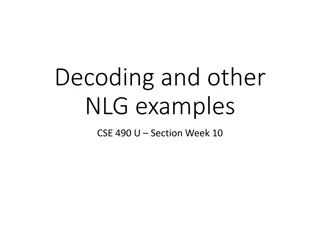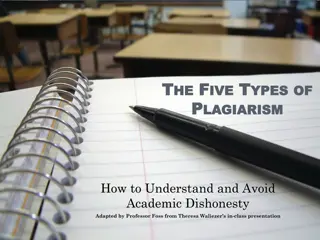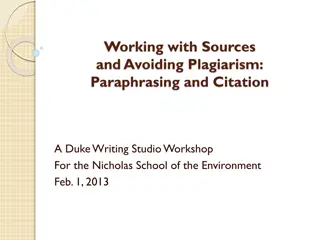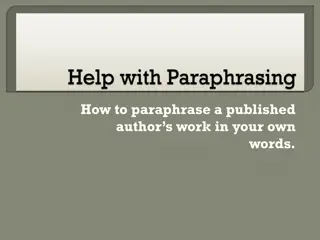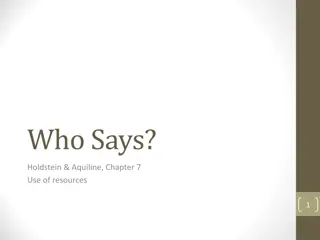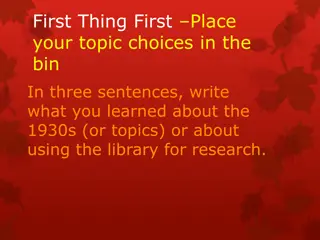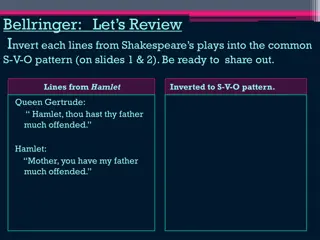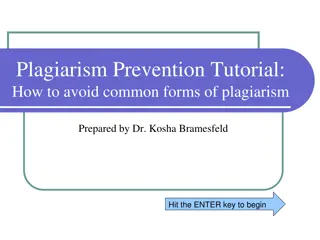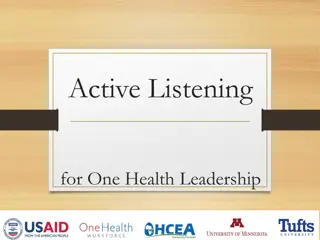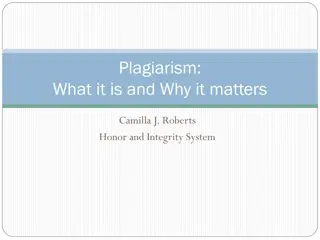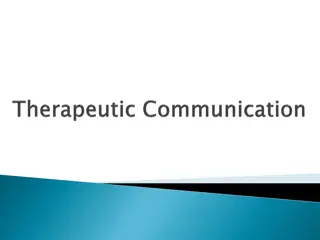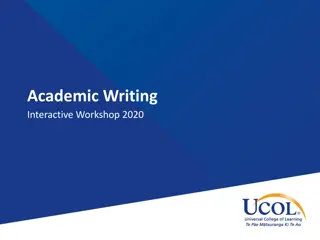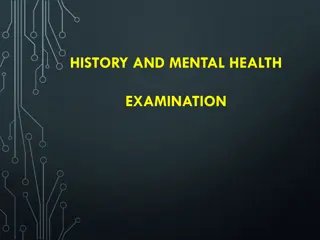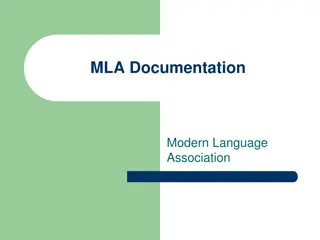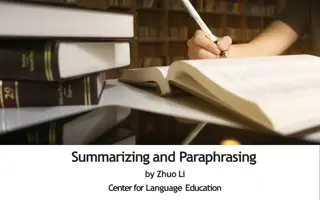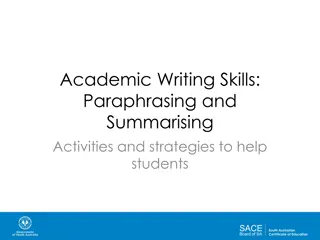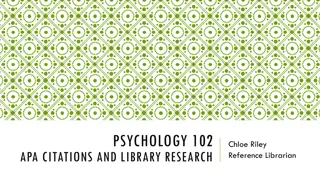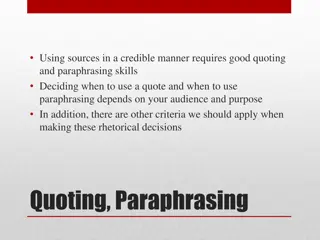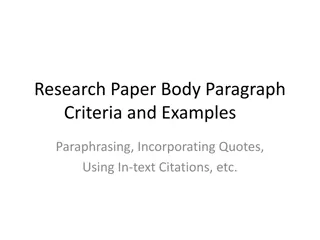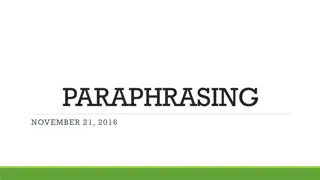Advanced English Course for Ph.D. Students
Prof. Dr. Ahmed Ali Mohammed's lecture on paraphrasing and quoting in academic writing. Learn strategies to develop paraphrasing skills and understand the purpose of paraphrasing in research.
0 views • 15 slides
Comprehensive Overview of English Writing Course
This comprehensive English writing course, led by lecturer Muhammad Muslim Nasution, covers various aspects such as grammar, vocabulary, writing styles, and assessments. Students are required to actively participate, submit assignments, attend classes regularly, and produce writing projects. The cou
2 views • 8 slides
Engaging English Class with Senior Teacher Manik Chandra Majumder
Join Senior Teacher Manik Chandra Majumder's English class at Gazirhat High School for an interactive learning experience focusing on summarizing, paraphrasing, and direct/indirect speeches. Students will enhance their interpretive skills through interviews, summary writing exercises, and text analy
3 views • 61 slides
Meta Paraphrasing: A Teaching Strategy for Learning and Practicing Paraphrasing
Paraphrasing is a vital skill that demonstrates understanding, allows integration of ideas ethically, and enhances credibility. This strategy involves proper analysis, using one's words, and citing sources accurately to avoid plagiarism.
5 views • 18 slides
Mastering Paraphrasing and Summarizing Techniques
Learn the art of paraphrasing and summarizing by practicing with exercises on rewriting passages from Rosa Parks' essay in your own words. Understand the nuances of sentence structure, word choices, and sentence types to create effective paraphrases. Discover key tips for writing a good paraphrase,
6 views • 19 slides
Understanding Plagiarism: A Comprehensive Overview
Plagiarism, specifically remix plagiarism and paraphrasing plagiarism, is discussed in detail, highlighting the act of presenting others' work as one's own without proper acknowledgment. It covers types of plagiarism, consequences, and examples to enhance understanding of this academic misconduct.
1 views • 11 slides
Effective Communication Techniques in Nursing Education
Ms. Sify Antoo, a Clinical Instructor at JMCON, teaches students about communication techniques such as listening, broad openings, restating, clarification, and more. These skills are essential for nurses to establish rapport with patients, understand their needs, and provide effective care. By focu
0 views • 34 slides
Mastering Quoting, Paraphrasing, and Summarizing Skills in Academic Writing
Understanding the importance of quoting, paraphrasing, and summarizing in academic writing, this tutorial explains when and how to use each method effectively. Quoting involves repeating exact words for crucial definitions or evidence, paraphrasing focuses on using your own words to convey understan
2 views • 14 slides
Organizing Research Paper with Notecards
Learn how to efficiently organize a research paper using notecards. Understand the importance of source cards, notecard structure, and paraphrasing techniques for effective research organization and avoidance of plagiarism.
0 views • 11 slides
Translation Strategies Used by Tourism Practitioners in Explaining Cultural Terms
Investigating strategies employed by tourism practitioners to translate cultural terms, this research involved a qualitative study with 74 respondents. Findings revealed various translation methods used, such as cultural substitution, loan words, and paraphrasing. The study aims to explore factors i
2 views • 16 slides
Core Summary and Examiner Comments on Sample Student Responses
Candidates provided advice for visitors based on a scenario involving climbing, with varying levels of success. While one response was deemed too lengthy and lacked paraphrasing, another started with relevant information and scored better in content. However, language marks suffered due to heavy rel
0 views • 18 slides
Practice Reading and Paraphrasing with HACKERS TOEIC
Enhance your English skills by practicing reading comprehension and paraphrasing exercises using the HACKERS TOEIC materials provided. Test your understanding of letters, emails, and vocabulary while improving your language proficiency. Sharpen your ability to interpret and respond to written conten
0 views • 21 slides
Effective Techniques for Paraphrasing and Referencing
Paraphrasing involves presenting others' ideas in your own words with proper citations, while summarizing condenses information. Synthesizing sources in writing provides new insights. Understanding and internalizing the text are vital for effective paraphrasing.
2 views • 26 slides
Mastering Paraphrasing to Avoid Plagiarism
Paraphrasing is a valuable skill that allows writers to express ideas in their own words while giving credit to original sources. By following specific steps and practicing examples, one can effectively paraphrase complex information and enhance understanding. The process helps in retaining the esse
0 views • 13 slides
Understanding Plagiarism: Types, Examples, and Prevention Techniques
Plagiarism is a serious academic offense that involves using someone else's work without proper acknowledgment. This publication delves into the different forms of plagiarism - intentional and accidental, such as self-plagiarism, and provides examples to help readers understand what constitutes plag
0 views • 21 slides
Decoding and NLG Examples in CSE 490U Section Week 10
This content delves into the concept of decoding in natural language generation (NLG) using RNN Encoder-Decoder models. It discusses decoding approaches such as greedy decoding, sampling from probability distributions, and beam search in RNNs. It also explores applications of decoding and machine tr
0 views • 28 slides
Understanding and Avoiding Plagiarism: Types, Consequences, and Prevention
Understand the five types of plagiarism, from intentional to unintentional, and learn how to identify, avoid, and properly cite sources to prevent academic dishonesty. Explore techniques for paraphrasing, quoting, and documentation styles like MLA and APA to ensure academic integrity.
5 views • 12 slides
Mastering Source Usage and Avoiding Plagiarism: Essential Guidelines
Effective paraphrasing and proper citation are crucial to avoid plagiarism. Understanding when to use direct quotations, paraphrases, or summaries helps maintain originality in research papers. Proper citation formats, in-text citations, and reference lists are essential components. Remember, a good
0 views • 12 slides
Effective Techniques for Paraphrasing Academic Work
Paraphrasing published author's work requires time, understanding, and persistence. Recognize the distinction between quoting and paraphrasing, emphasizing the importance of citations. Avoid excessive quoting in social sciences, preferring paraphrasing. Spend ample time reading and discussing ideas
0 views • 23 slides
Effective Use of Sources in Academic Writing
Utilizing resources effectively in academic writing involves proper use of summarizing, paraphrasing, quoting, and selecting among these techniques based on importance. It is essential to avoid patchwriting, maintain clarity, and ensure the original work's integrity while crafting your argument.
0 views • 6 slides
Understanding Direct Quotes and Paraphrasing in Writing
Writers often use direct quotes to capture the exact words of a speaker, while paraphrasing involves restating the information in one's own words. It's crucial to use quote marks appropriately and accurately when referencing sources in writing. Remember, direct quotes retain the original speaker's w
0 views • 25 slides
Understanding Plagiarism and Proper Citation Techniques
Plagiarism is a serious academic offense that involves using someone else's work without proper acknowledgment. This includes copying text from the internet without citation or failing to use quotation marks when quoting an author. It is important to cite sources correctly, even when summarizing or
0 views • 38 slides
Exploring Shakespeare's Plays: Paraphrasing and Analyzing Syntax
Dive into Shakespeare's plays by transforming lines into the common S-V-O pattern, analyzing how suffixes impact word function, and practicing comprehension strategies like paraphrasing. Discover how dialogue and incidents in plays reveal character aspects and propel action as intended by Shakespear
0 views • 11 slides
Mastering Paraphrasing and Summarizing in Academic Writing
Developing the skill of paraphrasing and summarizing is crucial in academic writing as it involves interpreting complex ideas and expressing them in your own words. Proper citation is essential even when paraphrasing to acknowledge the original source. Understanding cohesive devices and identifying
2 views • 27 slides
Plagiarism Prevention Tutorial: How to Avoid Common Forms of Plagiarism
This tutorial by Dr. Kosha Bramesfeld provides valuable insights on understanding, preventing, and avoiding plagiarism. Learn about the various forms of plagiarism, the importance of citing sources, using APA style, paraphrasing, and creating references to maintain academic integrity. Avoid the seve
0 views • 78 slides
Enhancing One Health Leadership Through Active Listening
Explore the importance of active listening in One Health leadership, focusing on techniques such as reflecting, paraphrasing, and repeating. Discover the differences between dialogue and debate, and learn about the listening spectrum. Engage in exercises to deepen listening skills and communication
0 views • 15 slides
Understanding Paraphrasing, Summarizing, and Direct Quoting for MLA Style
Exploring the differences among paraphrasing, summarizing, and direct quoting in MLA style. Paraphrasing involves rewriting in one's words, summarizing captures main ideas concisely, and direct quoting requires identical replication. These methods add credibility, support arguments, and serve variou
0 views • 6 slides
Understanding Plagiarism: Importance and Consequences
Plagiarism involves copying someone else's work without giving proper credit, which can have serious repercussions like academic penalties and loss of credibility. It's crucial to distinguish between paraphrasing, proper citation, and original content creation to uphold academic integrity.
0 views • 22 slides
Enhancing Therapeutic Communication in Health Education
Establishing a therapeutic relationship is crucial in health education to achieve positive patient care goals. Effective therapeutic communication involves planned acts using various techniques to ensure a shared understanding. It focuses on clear, consistent, and direct communication, incorporating
0 views • 35 slides
Academic Writing Interactive Workshop 2020
Explore the essentials of academic writing through this interactive workshop. Discover the key elements such as paraphrasing, formal language, and critical thinking. Learn how to effectively paraphrase ideas with citations, follow steps to enhance your paraphrasing skills, and engage in practical ac
0 views • 22 slides
Understanding History and Mental Health Examination
Conducting a thorough history and mental health examination is crucial in assessing individuals' well-being. This process involves collecting data, analyzing information, setting goals, creating care plans, implementing interventions, and evaluating outcomes. Clinical interviews, client assessments,
0 views • 32 slides
Effective Techniques for Incorporating Source Material in MLA Documentation
Paraphrasing plays a crucial role in research writing, with 75% of research material recommended to be paraphrased. Validating your sources by acknowledging their credentials is essential. Understanding attribution verbs and correctly citing sources using parenthetical citations and corresponding en
0 views • 24 slides
Effective Techniques for Summarizing and Avoiding Plagiarism
Effective strategies for summarizing include understanding the text, selecting relevant information, and rewriting main ideas in your own words. To avoid plagiarism, utilize direct quotations with proper citations, practice paraphrasing, and synthesize information from various sources. A good summar
0 views • 19 slides
Mastering Academic Writing: Paraphrasing and Summarising Techniques
Understanding the importance of paraphrasing and summarising in academic writing is crucial to avoid plagiarism and effectively integrate evidence. The difference between the two techniques lies in the length and depth of the content. Effective paraphrasing involves skillfully rephrasing original co
0 views • 19 slides
Mastering APA Citations and Avoiding Plagiarism in Research
Understanding the importance of citations in academic writing, this resource provides insights on plagiarism, summarizing vs. paraphrasing, patchwriting, and working with APA Style. Discover how to effectively cite sources, prevent unintentional plagiarism, and enhance your research skills.
0 views • 21 slides
Effective Use of Quoting and Paraphrasing in Academic Writing
Learning when to quote and when to paraphrase in academic writing is crucial for credibility. Quotations should be used sparingly, with attribution and relevant introductions. Signal verbs like acknowledges, claims, and more enhance attribution. Citing sources effectively adds credibility to your wo
0 views • 12 slides
Understanding Plagiarism: Types, Consequences, Referencing, and Paraphrasing
Plagiarism involves using someone else's work without acknowledgment, with intentional and unintentional forms. It can lead to severe consequences. Referencing and paraphrasing are key strategies to avoid plagiarism, using the Harvard Author-Date method. Proper in-text referencing and citation are c
0 views • 26 slides
Effective Techniques for Writing Research Paper Body Paragraphs
Learn the essential components of a well-structured research paper body paragraph, including crafting a clear topic sentence, incorporating paraphrased information, using in-text citations correctly, and leading into quotes effectively. Examples and criteria provided for paraphrasing, citations, and
0 views • 10 slides
Paraphrasing Techniques: Enhancing Your Writing Skills
Paraphrasing involves rephrasing content in your own words while retaining the original meaning. This process includes changing synonyms, word forms, and sentence structures. By mastering paraphrasing techniques, you can improve the clarity and originality of your writing. Explore examples and tips
0 views • 25 slides
Mastering Textual Evidence: Paraphrasing Techniques and Strategies
Learn the art of paraphrasing through techniques such as replacing subjects and words, rearranging sentences, and condensing information. Understand the difference between quoting, summarizing, and paraphrasing, illustrated with examples and tips on effective paraphrasing. Remember the R.A.P. approa
0 views • 8 slides
